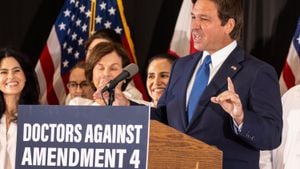Donald Trump is set to return to the White House for another term, and with it, there are questions swirling around his healthcare policy proposals, particularly concerning mental health and substance use. During his first term, this former president laid the groundwork for some significant reforms aimed at addressing these issues, but there's uncertainty about whether he will continue down this path.
Upon entering the Oval Office, Trump's commitment to "law and order" trickled down to public health policies, especially concerning mental health and substance abuse. He campaigned on shaking up public health institutions and overhauling federal health programs, aiming to lower the high costs associated with the healthcare system. Yet, it's still unclear how his administration's approach will evolve, especially for Texans who have felt the repercussions of his policies firsthand.
Experts on mental health and substance abuse from Texas describe potential changes as a mixed bag. While Trump’s first term facilitated unprecedented advancements—including substantial funding through COVID-19 relief dollars for mental health programs—these funds are nearing expiration. Will the support for mental health programs continue, or will they fade away like other fleeting policies?
Dr. Octavio Martinez, executive director of the Hogg Foundation for Mental Health at the University of Texas at Austin, expressed cautious optimism. "Trump made beneficial moves for mental health during his first term," he noted. "Now we brace for impact as those funds are set to run out next year. Their expiration could be significant for the state's mental health services.
There was tangible change during Trump’s first term, with over $2 trillion allocated through the Coronavirus Aid, Relief, and Economic Security (CARES) Act. Texas was allotted about $8 billion of this package, which helped fund innovative mental health efforts such as telepsychiatry programs aimed at schools and communities. Access to mental wellness services grew, as did the community's role in supporting mental health initiatives.
One of the more notable accomplishments of Trump's initial presidency was the establishment of the 988 crisis hotline. Launched in 2020, this service connects individuals experiencing mental health crises 24/7 with trained counselors. Many advocates had fought for its implementation for years, and it holds major significance for those needing immediate support. "The 988 hotline was another significant development during Trump’s term,” said Martinez. Although there are hurdles to overcome for its successful implementation—like staffing challenges particularly felt in rural areas—many hope for its expansion.
On the substance use front, Trump declared the opioid crisis as a national emergency. Nearly $2 billion worth of grants were distributed for various programs aimed at combating addiction, including $27 million going directly to Texas. These funds were utilized for public health campaigns centered around fentanyl and anti-overdose medications. While these efforts might have alleviated immediate problems, experts warn against the potential changes on the horizon. If Robert F. Kennedy Jr. holds the position of U.S. health secretary, experts fear progress on substance use treatment could be jeopardized.
Kennedy has been criticized for his controversial views on mental health medications and has made statements about potential links between antidepressants and tragic events like school shootings. His appointment could shift resources and approaches to mental health treatment significantly. Nevertheless, support for increased funding across party lines has remained, with government and policy experts maintaining some hope for the future.
Challenges are abundant as Trump's second term approaches, with many experts highlighting the impending expiration of COVID-related funding as the main concern. Since the state had received about $86.1 billion from various relief bills between 2020 and 2021—much of which was allocated toward mental health resources—the looming financial cliff raises eyebrows across the board.
For example, Texas schools utilized over $19 billion from the Elementary and Secondary School Emergency Relief Fund, with around 73% of districts reporting funds were directed toward mental health services. Martinez pointed out, “We've built much of our mental health response on pandemic-related funding, and it's worrying to think about what happens when those dollars vanish.”
Another pressing issue for Trump is ensuring mental health coverage is treated equally to other medical conditions by health insurance companies. According to reports, nearly one out of five youths covered by private insurance lack mental health coverage, leaving many unable to access necessary treatment purely based on cost. Martinez stressed the urgency of solving this disparity: “It’s imperative to make sure physical and mental health are viewed equally by insurance providers.”
Trump’s proposed solutions are also stirring contention. His latest plan includes federally funded homeless camps aimed at addressing severe mental health issues among the homeless population. He expressed the sentiment, “We are making the many suffer for the whims of the deeply unwell few.” The proposal involves creating large tent cities where mental health professionals would provide care. While this approach could indicate attention to the problem, it raises significant ethical concerns. Critics argue it echoes the outdated practice of institutionalizing the mentally ill, which started to decline nearly four decades ago.
Mentally ill individuals confined to such camps could lead to consequences similar to the era of asylums. Studies show forced treatment often leads to poor outcomes, leading experts to wonder whether this measure could do more harm than good. Martinez remarked, “The law-and-order focus on homelessness is concerning. Programs addressing these issues through healthcare have proven to be far more effective.”
Following the trend of law enforcement, Trump seeks to ban urban camping—a method highlighted by numerous state legislators. Just earlier this year, the U.S. Supreme Court backed such bans, allowing local governments to impose fines on individuals experiencing homelessness. The number of homeless individuals in Texas rose over 12% last year, returning to pre-pandemic levels with estimates showing about 27,000 individuals are currently homeless.
Trump’s approach to combating substance abuse has been predictably intertwined with broader topics like border security. Critics argue tighter border conditions will do nothing to curb fentanyl and opioid trafficking, though Trump may lean on these strategies as indicators of his administration's efforts to tackle the drug crisis. Harris, of the Baker Institute, pointed out, “If Trump merely maintains the progress he made during his first term, it’s already a substantial win for mental health advocacy.”
With mental health issues surging, many Texans are left with bated breath, hoping whatever direction Trump's second term takes won’t erase the gains made during his first. The clock's ticking, and the future of mental health care hangs in the balance, with millions relying on the policies enacted to support and uplift their communities.



